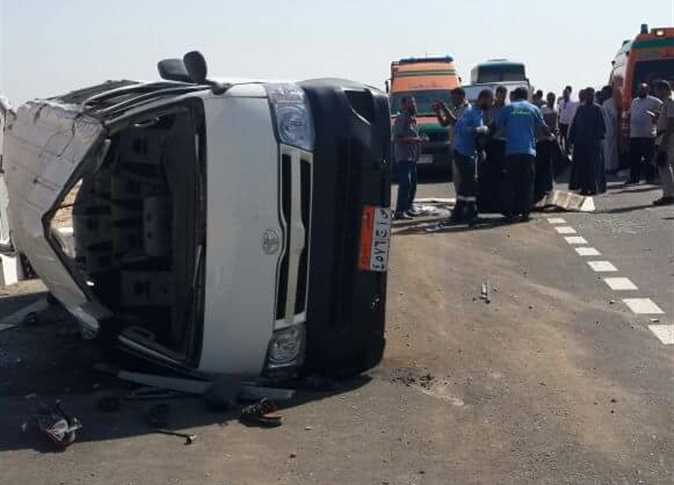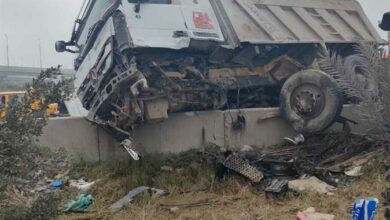Misrata – A few hundred meters from the sea, over ramshackle huts, coarse shrubbery, and rocky desert terrain, the bodies of Qadhafi’s slain combatants lie in a jagged column, shrouded in bloodied white cloth. A man garbed in a beige robe and skullcap sprinkles perfume on each while murmuring Islamic recitations.
The ten bodies, sheltered under a makeshift tent, will soon find their way to the adjacent cemetery where others are buried. In the small plot of land outside Libya’s besieged western port of Misrata, nearly 550 bodies are entombed in wooden boxes paved over with cement.
The majority of the graves have a number associated with them that corresponds with a picture and the possessions found on each soldier. The nearly 200 graves that don't have a number contain bodies ravaged beyond recognition.
As clashes continue to rage on Misrata’s two primary battlefronts – those to the east and west – the death toll continues to rise, with volunteer gravediggers taking on the ghastly work of interring the many bodies.
“Some say: ‘This is our enemy. They’ve killed and done such tragic things. Why are you doing this?’” says Abdel Hafiz Bou Qurain, the cleric charged with overseeing the burial operations. “But the Prophet obligated us to do this.”
Despite widespread reports – from Libya’s rebels and independent observers alike – suggesting that Qadhafi forces have defiled the rebel dead, military and religious authorities in Misrata are making sure each loyalist soldier killed in the conflict receives a burial in accordance with Islamic tradition.
Trucks bring in the bodies from the battlefield. The clothes are stripped and the bodies are washed. The crimson-stained bulletproof vests, boots and other articles of clothing lie in a menacing pile. After the religious rituals, they are carried one by one on stretchers over to the boxes. The six non-Muslims collected from the battlefield occupy a non-descript graveyard outside the concrete perimeter wall, a structure built to fend off blistering coastal winds.
“We put the [Muslim] bodies tilted towards Mecca,” says volunteer Mahmoud Mofta. “This is the Islamic way.”
Although violence in urban Misrata raged unabated for nearly three months, and now has merely shifted to the port city’s outskirts, those administering the burial process here are working under the impression that lasting peace will one day return.
“In case the relatives come to ask for the missing people, then we will have the documentation and photo and they can collect the belongings. Everyone has a family,” says volunteer gravedigger and chemical engineer Mohamed Jannet.
Misrata’s rebels say many of Qadhafi’s troops are coerced into fighting or are force-fed alcohol and drugs before being sent into combat. And many in Qadhafi’s legions, the rebels say, are just children.
“They’ve been brainwashed but they are still our kids,” says Jannet. “I’m obligated [to do this work] first by religion then by nationalism.”
Soldiers on the front echo those claims. They say they’ve witnessed Qadhafi forces kill soldiers who refused to fight or who attempted to surrender. According to rebel fighter Faraj al-Misteiry, some of those who managed to surrender evidenced a lack of conviction in Qadhafi’s army.
“Some kids surrendered with full magazines,” says Misteiry. “They were crying.”
Vague and unsubstantiated reports have surfaced in recent weeks indicating that some rebels have disposed of Qadhafi’s dead in un-Islamic ways, such as simply throwing the bodies into the sea. Misteiry unequivocally dismisses such claims.
“Perhaps the reason behind such reports is to make disagreement and divide us,” says Misteiry. “In the end, all bodies must be treated with respect, like we treat our dead. We’re all human beings.”
As of Monday, there are said to be 546 bodies buried at the coastal cemetery. The number is likely a very poor reflection of Qadhafi’s total losses in Misrata, the primary rebel stronghold in Libya’s west. Aside from the hundreds of Qadhafi soldiers that have been captured – according to international law, prisoners of war may not be interviewed by the media – Qadhafi’s losses probably include significantly more deaths.
“There are thousands of bodies not buried here,” says Hisham Mohamed, a former government notary who now is responsible for handling the personal belongings of dead and captured soldiers. “According to eyewitnesses, Qadhafi’s forces have taken a lot of their dead back.”
Jannet says it was impossible for the rebels to collect all of Qadhafi’s dead due to the intensity and the indiscriminate nature of the urban assault.
“In the early days, some were not buried because we were running from the clashes and people were unable to collect the bodies,” says Jannet. “We’re still trying to look for all the bodies.”
Restrictions on access to the burial ground were earlier imposed and, according to the volunteers there, are being implemented again. Jannet says he wants coverage limited because the volunteer gravediggers fear their work will be misunderstood.
“We bury them like this, not to send a message or to impress anyone, but strictly to treat them with respect,” he says. “This is a tragedy. We don’t want to publicize it.”




